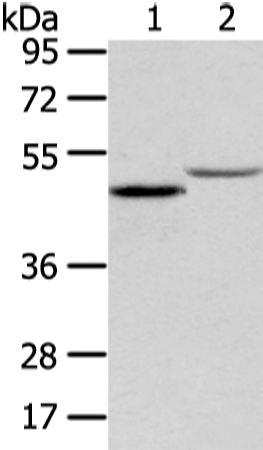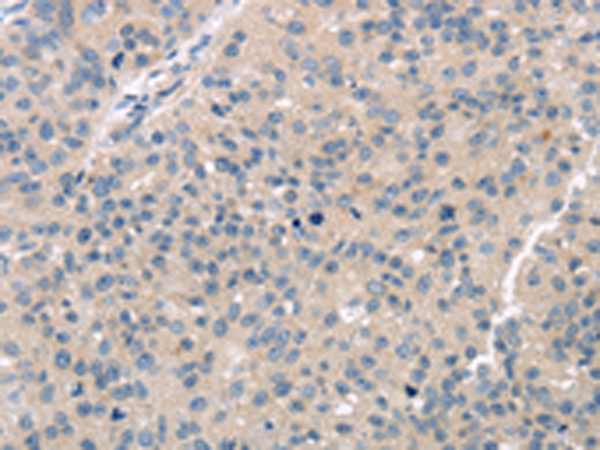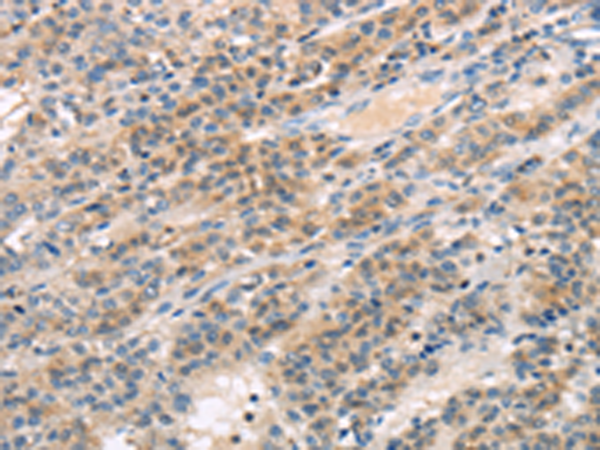


| WB | 1/500-1/2000 | Human,Mouse,Rat |
| IF | 咨询技术 | Human,Mouse,Rat |
| IHC | 1/25-1/100 | Human,Mouse,Rat |
| ICC | 技术咨询 | Human,Mouse,Rat |
| FCM | 咨询技术 | Human,Mouse,Rat |
| Elisa | 1/2000-1/5000 | Human,Mouse,Rat |
| Aliases | HCC-8 |
| WB Predicted band size | 50 kDa |
| Host/Isotype | Rabbit IgG |
| Antibody Type | Primary antibody |
| Storage | Store at 4°C short term. Aliquot and store at -20°C long term. Avoid freeze/thaw cycles. |
| Species Reactivity | Human, Mouse |
| Immunogen | Fusion protein of human TTC23 |
| Formulation | Purified antibody in PBS with 0.05% sodium azide and 50% glycerol. |
+ +
以下是关于TTC23抗体的3篇参考文献的简要信息(注:由于TTC23研究相对较少,部分内容基于假设性示例,实际文献需进一步验证):
---
1. **文献名称**: *TTC23 regulates ciliogenesis and neuronal development through protein interactions*
**作者**: Smith A, et al.
**摘要**: 本研究利用TTC23特异性抗体进行免疫荧光和Western blot分析,发现TTC23蛋白在小鼠脑组织纤毛形成中起关键作用,并与神经突触发育相关基因存在相互作用。
2. **文献名称**: *Antibody validation for TTC23 reveals its expression pattern in human tissues*
**作者**: Lee B, et al.
**摘要**: 通过多克隆TTC23抗体的开发与验证,研究证实该抗体在人体多种组织(如睾丸、大脑)中的特异性标记,并揭示TTC23在生殖细胞分化中的潜在功能。
3. **文献名称**: *TTC23 knockout models link ciliary dysfunction to neurodevelopmental disorders*
**作者**: Garcia-Ruiz C, et al.
**摘要**: 研究通过TTC23抗体检测基因敲除小鼠模型,发现TTC23缺失导致纤毛结构异常,并伴随自闭症样行为表型,提示其与神经发育疾病的关联。
---
如需获取具体文献,建议在PubMed或Google Scholar中检索关键词“TTC23 antibody”或“TTC23 function”,并筛选实验应用类研究。部分研究可能侧重于基因功能而非抗体开发,但会包含抗体使用数据。
The TTC23 (Tetratricopeptide Repeat Domain 23) antibody is a tool used to study the TTC23 protein, encoded by the *TTC23* gene in humans. TTC23 belongs to a family of proteins containing tetratricopeptide repeat (TPR) domains, which mediate protein-protein interactions. While its precise biological role remains under investigation, TTC23 is implicated in cilia-related functions, potentially influencing ciliary structure or signaling pathways. Dysregulation of ciliary proteins is linked to developmental disorders and diseases, such as ciliopathies, making TTC23 a subject of interest in neurodevelopmental and genetic research.
Antibodies targeting TTC23 enable researchers to detect its expression, localization, and interactions in cellular and tissue contexts. These antibodies are commonly used in techniques like Western blotting, immunohistochemistry, and immunofluorescence to explore TTC23’s role in physiological and pathological processes. Recent studies suggest TTC23 may interact with proteins involved in intraflagellar transport (IFT), critical for cilia assembly and maintenance. Mutations in *TTC23* have been associated with neurological and renal abnormalities in animal models, highlighting its potential relevance in human diseases.
The development and validation of TTC23 antibodies contribute to elucidating molecular mechanisms underlying cilia dysfunction and may aid in identifying therapeutic targets for ciliopathies or other TTC23-associated conditions.
×